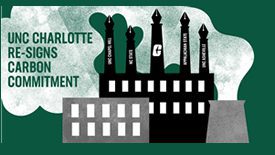UNC Charlotte re-signs carbon commitment

Chancellor Sharon L. Gaber reaffirmed the University’s commitment to climate action by re-signing the Carbon Commitment, one of the Presidents’ Climate Leadership Commitments maintained by Second Nature. The Carbon Commitment was first signed in 2009 by Chancellor Emeritus Philip L. Dubois.
More than 600 university presidents and chancellors have signed the Climate Leadership Commitments, including many UNC System schools such as N.C. State, UNC Chapel Hill, Appalachian State and UNC Asheville.
“Chancellor Gaber’s commitment to climate action confirms our status as a leader in environmental stewardship for our region and our state,” said Mike Lizotte, university sustainability officer.
The Carbon Commitment includes setting a target year to reach carbon neutrality, or zero net greenhouse gas emissions. “Carbon” refers to emissions of carbon dioxide, the main greenhouse gas produced by human activity, but these efforts cover all types of greenhouse gases. In 2009, the University set the year 2050 as its goal, as required by the Sustainability Policy of the UNC System. UNC Charlotte also set a shorter-term goal of reducing greenhouse gas emissions by 20% by 2020.
UNC Charlotte’s Sustainability Office submits a Greenhouse Gas Emissions Report annually to Second Nature. Past reports for UNC Charlotte can be found at the University’s dedicated page on the Second Nature reporting platform.
The 2020 report showed that University emissions are down 27% since 2009. Since the University has grown, progress is even greater per student (down 44%) and per building square foot (down 50%). The latest report covers July 2019 to June 2020, therefore including the decline in emissions after March 2020 in response to COVID-19. However, the University was on track to pass its 20% goal before operations were disrupted.
The largest contributor to greenhouse gas emissions for campus is electricity use. Emissions from electricity are a highlight for UNC Charlotte, with 36% fewer emissions today. Energy conservation efforts are paying off through lower costs and cleaner air. The electricity purchased by the University is also much cleaner today due to efforts by Duke Energy to phase out coal and add renewable energy.
The University has reduced emissions by the following, therefore showing it is possible to reduce pollution while growing and flourishing.
- Pumping heat to buildings by hot water pipes, replacing old inefficient steam lines
- Composting, recycling and reusing materials to send less to landfills, which emit greenhouse gases
- Shifting to electric vehicles, increasing bus service, building local housing and adding light rail service to cut emissions from transportation
“UNC Charlotte is committed to fostering a thriving culture based on integrity and respect that values all people and the planet,” said Gaber. “As good stewards of the environment, the University pursues sustainability and environmental justice through education, research and the management of scarce resources.”